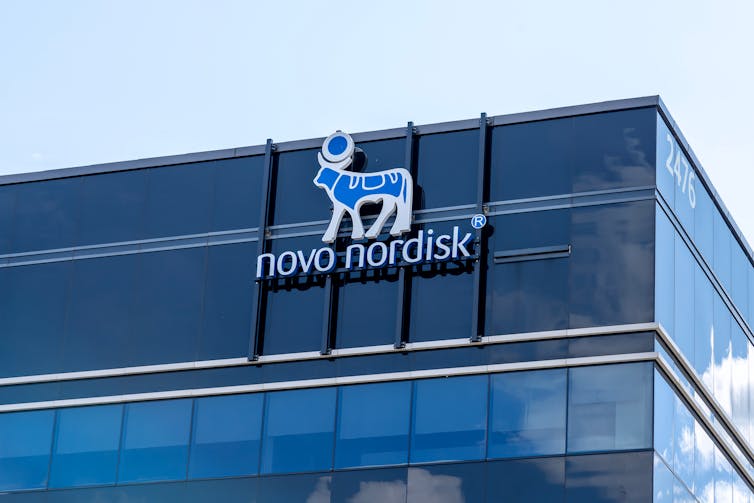A global shortage means some people with diabetes are struggling to access the drug semaglutide, which is sold under the brand name Ozempic.
The UK’s Department of Health and Social Care has recommended that no new patients are started on the drug. Ongoing shortages have also been reported in Australia and Ireland. Canada has also experienced intermittent shortages.
Ozempic has been used for the past few years to help people with diabetes manage their blood sugar levels. But in 2021, a clinical trial found that semaglutide could also help people lose weight due to its ability to suppress appetite hormones. This has led to a global surge in interest in the drug.
The company that manufactures semaglutide has since licensed a version for use in weight loss (called Wegovy). But the sheer demand for the drug is greater than the manufacturer is able to supply – which means that some people are turning to Ozempic for use off-label (unlicensed use) to lose weight.
It’s possible that because of this increased demand, shortages of both Ozempic and Wegovy in the UK may last until late 2024.
Why are there shortages?
Ozempic and Wegovy are both manufactured by the pharmaceutical company Novo Nordisk, which specialises in treatments for diabetes. They are the only company in the world manufacturing semaglutide as they own the patent for it.
The shortages of Ozempic and Wegovy are technically being fuelled by too many people using the drug off-label, causing demand to exceed supply. But the reason more people are seeking out semaglutide for weight loss in the first place may be due to social media endorsement and use by celebrities, driving a surge in interest.
This isn’t the first time social media and celebrity endorsement has influenced demand for certain medicines. For instance, the 2022 shortages in hormone replacement therapy (HRT) medications in the UK were linked to what has now been dubbed the “Davina McCall effect” after the British TV presenter spoke openly about menopause and using HRT to manage symptoms. This reportedly led to an uptick in demand for these products.
A year on, supplies of HRT have now mostly recovered, but pharmacies are still carefully monitoring supply. Given the global demand for semaglutide, it’s expected that these supply issues may last much longer – with the company expecting shortages of Ozempic alone may last in the UK into 2024.
Another issue contributing to shortages of Ozempic is that the company is having problems manufacturing and supplying Wegovy, which is licensed for weight loss. Although Novo Nordisk have reportedly reduced their promotion of Wegovy to “dampen demand”, people continue to turn to Ozempic to lose weight. Novo Nordisk has made clear, however, that the two products are not interchangable as they are licensed for different conditions, have different doses and require different clinical assessments.
How is this being addressed?
Alongside Uk authorities’ recommendation that no new patients are started on Ozempic, they have also requested that healthcare professionals only prescribe Ozempic for people with diabetes.

Novo Nordisk is working to amp up manufacturing capabilities. JHVEPhoto/ Shutterstock
Novo Nordisk said they are doing everything they can to respond to the increased demand for their products, including planning a US$2.3 billion (£1.8 billion) upgrade to their manufacturing facility. This may support increased capacity to manufacture and supply Wegovy and Ozempic.
Novo Nordisk have also requested that health authorities intervene and discourage off-label prescribing. The Medicines Healthcare Products Regulatory Authority (MHRA) in the UK has also been called upon to encourage responsible Ozempic use. This would ensure Ozempic products are available for people with the greatest clinical needs.
More recently, Novo Nordisk has also reduced the availability of some dosages of semaglutide in the US by 50%, presumably to be more targeted in their manufacturing efforts.
What’s next for Ozempic?
Prescribers have been advised to inform people about Ozempic shortages and to assess if alternative medications could be prescribed without causing harm. Ozempic should only be used for type 2 diabetes and not for weight loss. People wishing to use a semaglutide for weight loss who cannot access Wegovy should consult their healthcare professional for other treatment options.
Patients who use Ozempic have also been encouraged to order repeat supplies early to ensure they don’t run out.
The future of both Ozempic and Wegovy are intertwined and demand for both products shows no signs of waning despite warnings of possible side effects. Last year alone, Novo Nordisk recorded nearly US$9 billion (£7 billion) in sales of Ozempic. This figure could continue to climb given the current demand for these products.
The weight loss treatment market is a lucrative one and is estimated to reach US$100 billion (£79 billion) by 2030. The market may become more stable and competitive, with Novo Nordisk providing tablet-based products. Other companies are also investigating whether different active ingredients can lead to similar weight loss as semaglutide.
If these are shown to be effective, this could also help to alleviate supply shortages of semaglutide. When semaglutide’s patents expire beginning in 2030, this may further open up an opportunity for more companies to enter the market, making the product more readily available.
And, depending on the country, the patent may actually expire sooner than that. In Brazil, for example, it expires as early as 2026.



 Vanda Pharmaceuticals Wins FDA Approval for New Motion Sickness Drug After Four Decades
Vanda Pharmaceuticals Wins FDA Approval for New Motion Sickness Drug After Four Decades  U.S. Vaccine Policy Shifts Under RFK Jr. Create Uncertainty for Pharma and Investors
U.S. Vaccine Policy Shifts Under RFK Jr. Create Uncertainty for Pharma and Investors  Royalty Pharma Stock Rises After Acquiring Full Evrysdi Royalty Rights from PTC Therapeutics
Royalty Pharma Stock Rises After Acquiring Full Evrysdi Royalty Rights from PTC Therapeutics  TrumpRx.gov Highlights GLP-1 Drug Discounts but Offers Limited Savings for Most Americans
TrumpRx.gov Highlights GLP-1 Drug Discounts but Offers Limited Savings for Most Americans  Sanofi to Acquire Dynavax in $2.2 Billion Deal to Strengthen Vaccine Portfolio
Sanofi to Acquire Dynavax in $2.2 Billion Deal to Strengthen Vaccine Portfolio  Merck Raises Growth Outlook, Targets $70 Billion Revenue From New Drugs by Mid-2030s
Merck Raises Growth Outlook, Targets $70 Billion Revenue From New Drugs by Mid-2030s  Federal Appeals Court Blocks Trump-Era Hospital Drug Rebate Plan
Federal Appeals Court Blocks Trump-Era Hospital Drug Rebate Plan  Novo Nordisk and Eli Lilly Cut Obesity Drug Prices in China, Boosting Access to Wegovy and Mounjaro
Novo Nordisk and Eli Lilly Cut Obesity Drug Prices in China, Boosting Access to Wegovy and Mounjaro  Viking Therapeutics Sees Growing Strategic Interest in $150 Billion Weight-Loss Drug Market
Viking Therapeutics Sees Growing Strategic Interest in $150 Billion Weight-Loss Drug Market 
































